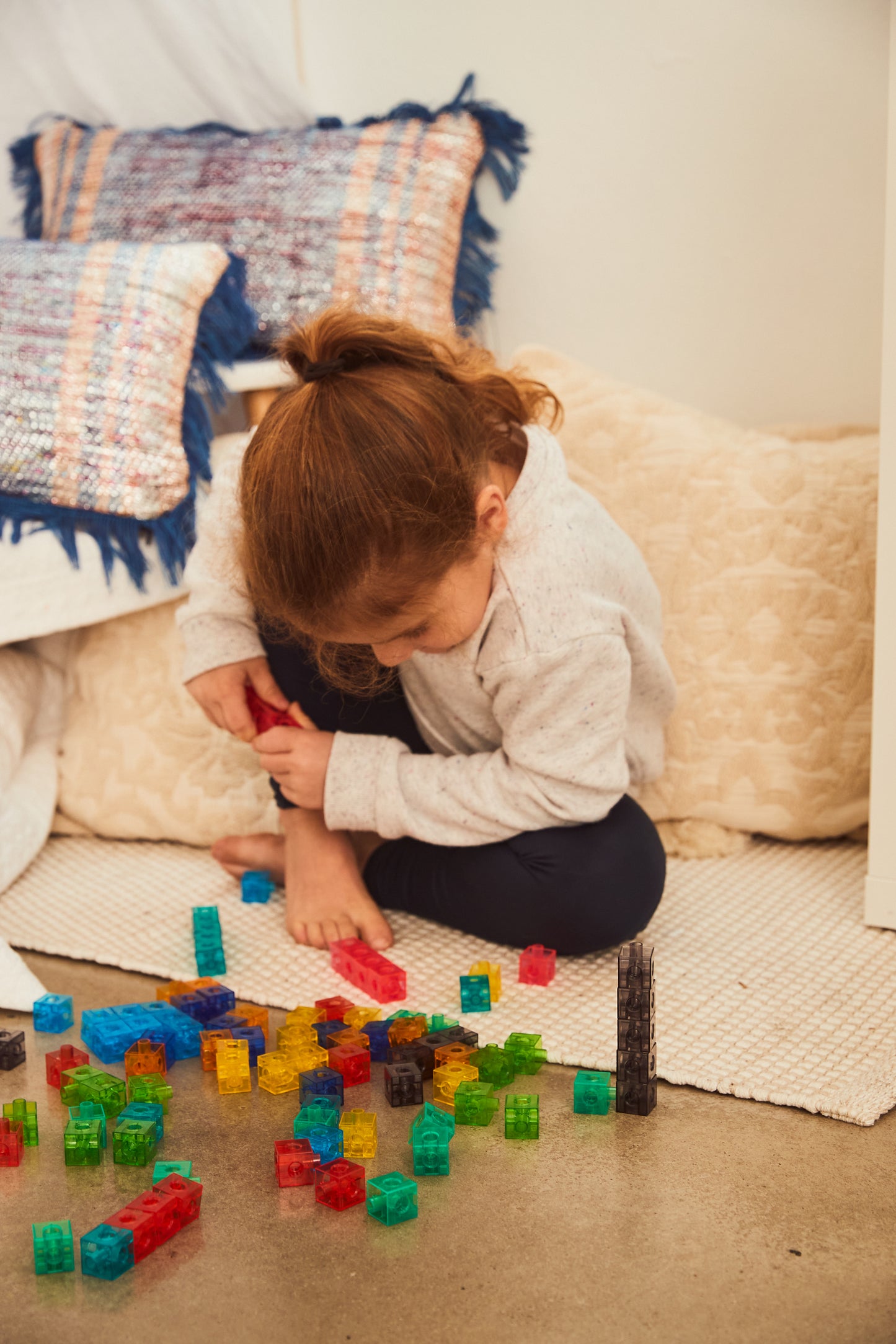
As World Philosophy Day approaches, celebrated on the third Thursday of November, (21st) it’s a great reminder for parents and caregivers to cultivate a curious and questioning mindset in children. While philosophy might sound complex for little ones, fostering critical thinking, inquiry, and exploration is highly achievable—and deeply valuable—even in early childhood. Using Edx Education’s play-based learning toys, such as Rainbow Pebbles®, My Gears®, construction sets, and other STEAM products, you can inspire children to think independently, ask questions, and become resilient problem-solvers.
The Power of Play in Building Cognitive Skills
Children are naturally inquisitive, always asking “Why?” and exploring the world around them. Play-based learning toys can channel that curiosity in a structured way, encouraging children to engage in inquiry and think critically about what they see, feel, and create. Toys like Rainbow Pebbles® are not just colourful shapes; they are tools that promote mathematical thinking, creative exploration, and hands-on learning.
Studies in child development show that activities that encourage critical thinking enhance cognitive skills such as problem-solving, reasoning, and adaptability. These skills don’t just support academic success; they also lay the foundation for lifelong learning and resilience. With toys that invite open-ended exploration, children can develop these skills in a fun and engaging way, helping them build confidence and independence.
How STEAM Toys Foster Critical Thinking and Persistence
STEAM (Science, Technology, Engineering, Art, and Mathematics) toys from Edx Education are specifically designed to engage children in activities that require them to hypothesise, test, and learn from results. Let’s explore some of Edx Education’s popular STEAM toys that support critical thinking and persistence:
1. Rainbow Pebbles®
Rainbow Pebbles® are vibrant, smooth stones in various sizes that children can stack, sort, and balance. This may look like simple play, but it’s a powerful cognitive exercise. Children learn cause-and-effect relationships as they stack pebbles and watch what works—and what doesn’t. They experiment with symmetry, balance, and spatial relationships, developing a basic understanding of physics and geometry. This kind of hands-on learning encourages children to ask questions, test hypotheses, and persist in achieving their goals, even if their stack topples over. Each time they rebuild, they practice resilience and refine their critical thinking skills.
2. My Gears®
My Gears® introduces children to the basics of engineering and mechanics through colourful, interlocking gears. As children connect gears and see how turning one moves the others, they start to understand principles of motion and mechanics. This exploration of cause and effect is crucial for cognitive development, as it teaches children how different components interact within a system. Children also learn persistence as they troubleshoot and experiment with new configurations. It’s a fantastic way to foster patience and resilience as they learn that mistakes are just opportunities to try again.
3. Construction Sets
Construction sets allow children to build, design, and innovate. Whether it’s creating a tower, a bridge, or an imaginary city, children engage in the engineering process. They learn to plan, test, and revise their ideas, cultivating critical thinking and problem-solving skills. These toys allow children to take ownership of their projects, helping them develop independence and confidence. Constructing something from scratch and watching it come to life instills a sense of pride and accomplishment that encourages them to keep exploring.
Encouraging Cognitive Development Through Inquiry
World Philosophy Day is a wonderful reminder that every child can think philosophically—even if it’s as simple as asking, “What happens if I do this?” or “Why did that fall down?” Encouraging children to ask questions and providing them with toys that support inquiry-based play opens doors to cognitive development and emotional growth.
Edx Education’s approach to play-based learning is all about fostering a love for exploration and discovery. When children are encouraged to explore freely, they naturally learn to observe, analyse, and synthesise information. This strengthens not only their cognitive abilities but also their self-awareness and confidence in tackling challenges.
The Role of Caregivers in Fostering a Growth Mindset
As caregivers and parents, your role in supporting this journey is invaluable. By providing children with open-ended toys and guiding them with patience and encouragement, you’re helping them build the resilience they need to face new challenges. Praise their efforts, celebrate their curiosity, and let them take their time to figure things out on their own. By doing so, you’re setting them on a path to become independent thinkers who are unafraid to take on new challenges.
Resources to Support Your Child’s Learning Journey
For those looking to explore more ways to engage children in inquiry-based learning, the Edx Education website offers a variety of downloadable resources, as well as episodes from the “Play, Learn & Create” podcast, where we discuss the importance of critical thinking, cognitive development, and resilience in early childhood. Our podcast features experts and practical tips to inspire you on this journey.
This World Philosophy Day, let’s embrace the power of questions, curiosity, and resilience. With Edx Education’s range of educational toys, every child has the opportunity to become a confident, critical thinker ready to take on the world.
